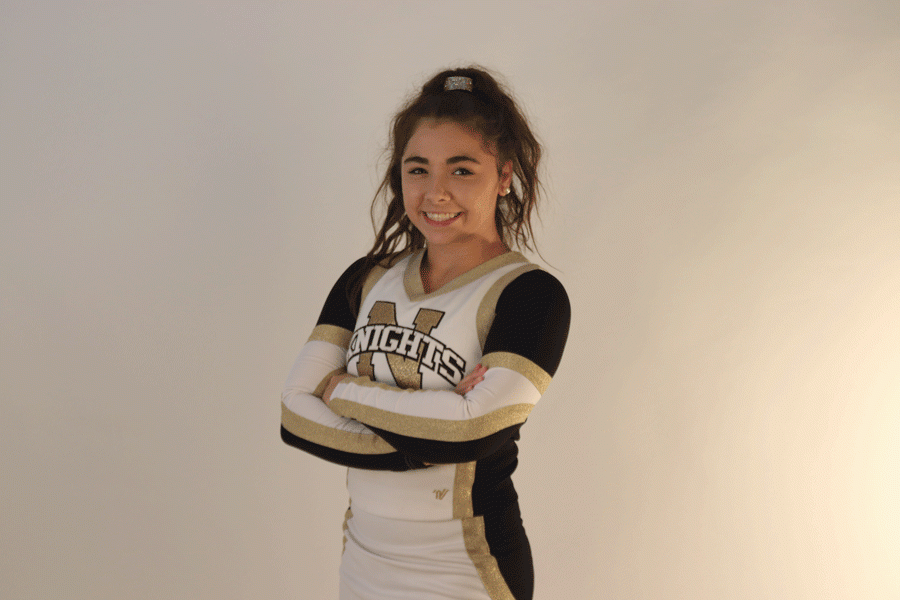Your donation will support the student journalists of Francis Howell North High School. Your contribution will allow us to purchase equipment and cover our annual website hosting costs.
Credit to Paige Westermann
Morghen Fisher has been a cheerleader throughout her four years of high school. While cheering, she suffers from back pain, but still persists for her love of cheering.
Senior Morghen Fisher Regularly Battles Back Pain While Cheering
Senior Morghen Fisher Regularly Battles Back Pain While Cheering, Yet She Still Persists in Her Passion
Published: October 3, 2018
It’s a daily procedure for Morghen Fisher and her team. Roll out the mats. Stretch. Warm up. The time is spent practicing stunts and doing routines. They’re filling, twisting, rolling and jumping. Perfecting their moves for performances. Now a senior, Fisher has been doing this for the past four years. She doesn’t feel it yet, but she knows the pain will come. It will feel like a pinch around those two points in her spine. Some tightness in her mid and lower back.
Fisher spends the time after cheer practice to rest and mend herself. Take ibuprofen to remove swelling. Use heating pads loosen up the muscles. Treat her back to keep it from getting worse. It’s a daily procedure for her.
“[The pain] kind of defeats you a little bit, because you know that it’s there, and you know that it’s causing you pain,” Fisher said. “But at the same time you know you have to push through for your team. It kind of motivates you and defeats you at the same time. It didn’t hurt as much during practice, but after practice is when it would start hurting.”
Knowing she will have to go through it all again the next day demotivates her further.
Fisher began her cheering in the sixth grade at a friend’s gym. Through practicing their skills everyday, being on a competitive cheer team and helping with a program that taught girls with disabilities cheer, Fisher and the other cheerleaders in her gym grew closer. For her, friendship and cheer go hand-in-hand. It’s through cheer that she’s made her best friends, and it’s through her friends’ encouragement that she gets the extra motivation to push through the pain on a daily basis.
“I see someone who has a lot of passion for what she did, and when times started getting hard for her, I had to just keep letting her know that it’s okay and that she can force through the pain and she was stronger than her mind would let her believe,” her best friend, senior Katie Von Harz said. ”It’s definitely upsetting because it does cause some limits on her, and it does affect the things that she loves to do the most. [However,] I always know that she’s strong enough to get through it.”
It was actually a problem in her neck that led Fisher to seeing a chiropractor during her sophomore year. There they took x-rays and found the cause of the back pain that plagued Fisher since she started cheering: her back was curved at two points. One in the mid back and the other in the lower. It wasn’t so much that she needed surgery, but enough to cause discomfort after exercise. Finally Fisher knew that the problems she had been experiencing had a reason. She had scoliosis.
“[Pain] wasn’t something that stopped me before,” Fisher said. “It didn’t really faze me much that I knew I had [scoliosis] because it didn’t affect me then. I didn’t want to change anything because I found out a name for what it was.”
She isn’t afraid of getting a major injury. Doctors haven’t given orders that limit her abilities; the pain however does. Scoliosis doesn’t increase her chances of getting injured, but when it starts to hurt, Fisher knows she needs to ease up. It will hurt to move. It will make it hard to lift other cheerleaders sometimes. Her battle with the pain is an ongoing ebb and flow. Some days are worse than others, but she still pushes through.
“She won’t stop doing it even though it hurts,” varsity Head Coach Tracy Wuertenberg said. “She won’t stop doing it because it’s something that she loves doing, and when there’s something you love doing, you’re going to do it as much as you possibly can. It’s like that with any other athlete.”
At the end of the day, Fisher goes back for her team. Giving up on the sport would be giving up on them. She helps her team, and they support her. The pain in her back makes cheering a little harder for her, but not impossible.
“They don’t let me get down on myself,” Fisher said. “If I don’t feel like I’m doing something to my full capability, they help me by letting me know that it’s okay and that I’m doing the best I can. I think it would be little harder [without them] because I am mentally hard on myself, so without those people around me, it would be a big challenge because I would be thinking that I can’t do things that I can.”

